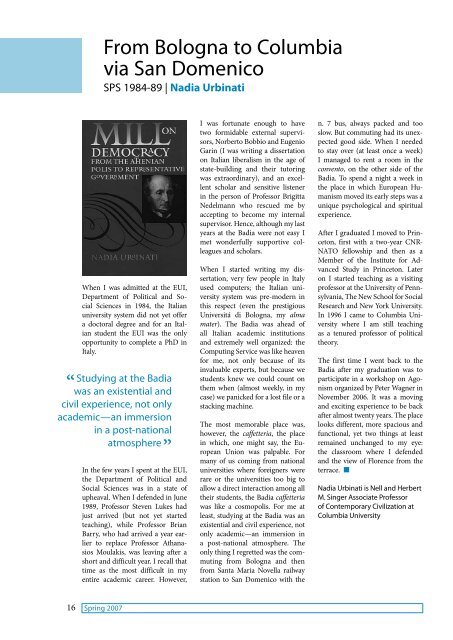Spring 2007 - European University Institute
Spring 2007 - European University Institute
Spring 2007 - European University Institute
Create successful ePaper yourself
Turn your PDF publications into a flip-book with our unique Google optimized e-Paper software.
1<br />
From Bologna to Columbia<br />
via San Domenico<br />
SPS 1984-89 | Nadia Urbinati<br />
When I was admitted at the EUI,<br />
Department of Political and Social<br />
Sciences in 198 , the Italian<br />
university system did not yet offer<br />
a doctoral degree and for an Italian<br />
student the EUI was the only<br />
opportunity to complete a PhD in<br />
Italy.<br />
“ Studying at the Badia<br />
was an existential and<br />
civil experience, not only<br />
academic—an immersion<br />
in a post-national<br />
atmosphere ”<br />
In the few years I spent at the EUI,<br />
the Department of Political and<br />
Social Sciences was in a state of<br />
upheaval. When I defended in June<br />
1989, Professor Steven Lukes had<br />
just arrived (but not yet started<br />
teaching), while Professor Brian<br />
Barry, who had arrived a year earlier<br />
to replace Professor Athanasios<br />
Moulakis, was leaving after a<br />
short and difficult year. I recall that<br />
time as the most difficult in my<br />
entire academic career. However,<br />
<strong>Spring</strong> <strong>2007</strong><br />
I was fortunate enough to have<br />
two formidable external supervisors,<br />
Norberto Bobbio and Eugenio<br />
Garin (I was writing a dissertation<br />
on Italian liberalism in the age of<br />
state-building and their tutoring<br />
was extraordinary), and an excellent<br />
scholar and sensitive listener<br />
in the person of Professor Brigitta<br />
Nedelmann who rescued me by<br />
accepting to become my internal<br />
supervisor. Hence, although my last<br />
years at the Badia were not easy I<br />
met wonderfully supportive colleagues<br />
and scholars.<br />
When I started writing my dissertation,<br />
very few people in Italy<br />
used computers; the Italian university<br />
system was pre-modern in<br />
this respect (even the prestigious<br />
Universitá di Bologna, my alma<br />
mater). The Badia was ahead of<br />
all Italian academic institutions<br />
and extremely well organized: the<br />
Computing Service was like heaven<br />
for me, not only because of its<br />
invaluable experts, but because we<br />
students knew we could count on<br />
them when (almost weekly, in my<br />
case) we panicked for a lost file or a<br />
stacking machine.<br />
The most memorable place was,<br />
however, the caffetteria, the place<br />
in which, one might say, the <strong>European</strong><br />
Union was palpable. For<br />
many of us coming from national<br />
universities where foreigners were<br />
rare or the universities too big to<br />
allow a direct interaction among all<br />
their students, the Badia caffetteria<br />
was like a cosmopolis. For me at<br />
least, studying at the Badia was an<br />
existential and civil experience, not<br />
only academic—an immersion in<br />
a post-national atmosphere. The<br />
only thing I regretted was the commuting<br />
from Bologna and then<br />
from Santa Maria Novella railway<br />
station to San Domenico with the<br />
n. 7 bus, always packed and too<br />
slow. But commuting had its unexpected<br />
good side. When I needed<br />
to stay over (at least once a week)<br />
I managed to rent a room in the<br />
convento, on the other side of the<br />
Badia. To spend a night a week in<br />
the place in which <strong>European</strong> Humanism<br />
moved its early steps was a<br />
unique psychological and spiritual<br />
experience.<br />
After I graduated I moved to Princeton,<br />
first with a two-year CNR-<br />
NATO fellowship and then as a<br />
Member of the <strong>Institute</strong> for Advanced<br />
Study in Princeton. Later<br />
on I started teaching as a visiting<br />
professor at the <strong>University</strong> of Pennsylvania,<br />
The New School for Social<br />
Research and New York <strong>University</strong>.<br />
In 199 I came to Columbia <strong>University</strong><br />
where I am still teaching<br />
as a tenured professor of political<br />
theory.<br />
The first time I went back to the<br />
Badia after my graduation was to<br />
participate in a workshop on Agonism<br />
organized by Peter Wagner in<br />
November 00 . It was a moving<br />
and exciting experience to be back<br />
after almost twenty years. The place<br />
looks different, more spacious and<br />
functional, yet two things at least<br />
remained unchanged to my eye:<br />
the classroom where I defended<br />
and the view of Florence from the<br />
terrace. n<br />
Nadia Urbinati is Nell and Herbert<br />
M. Singer Associate Professor<br />
of Contemporary Civilization at<br />
Columbia <strong>University</strong>

















